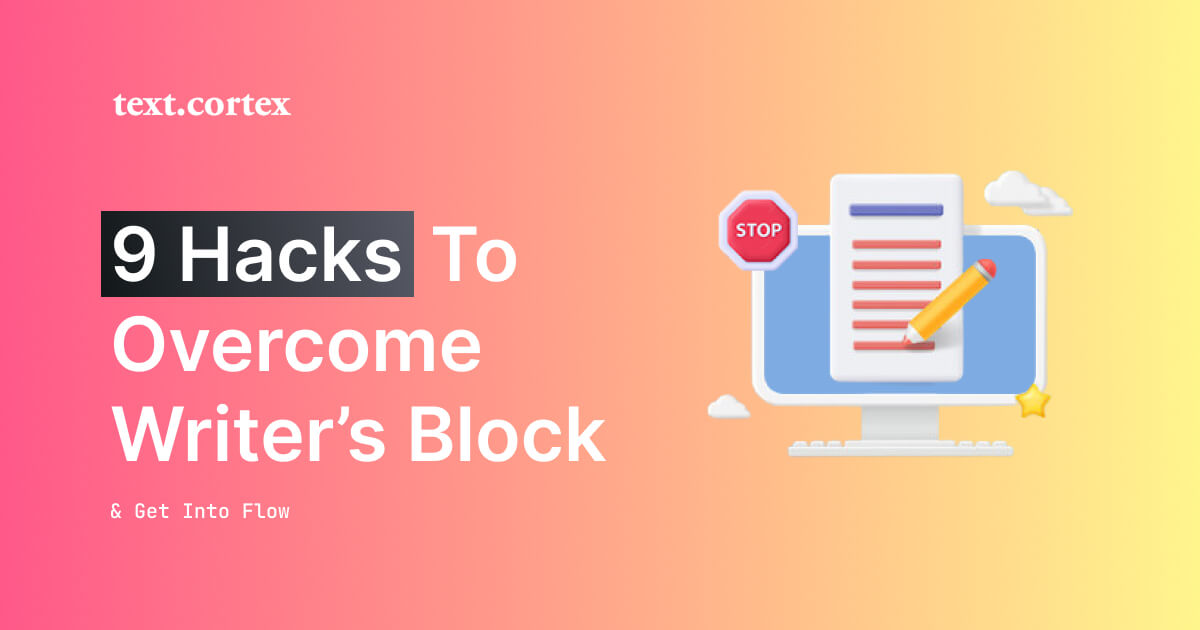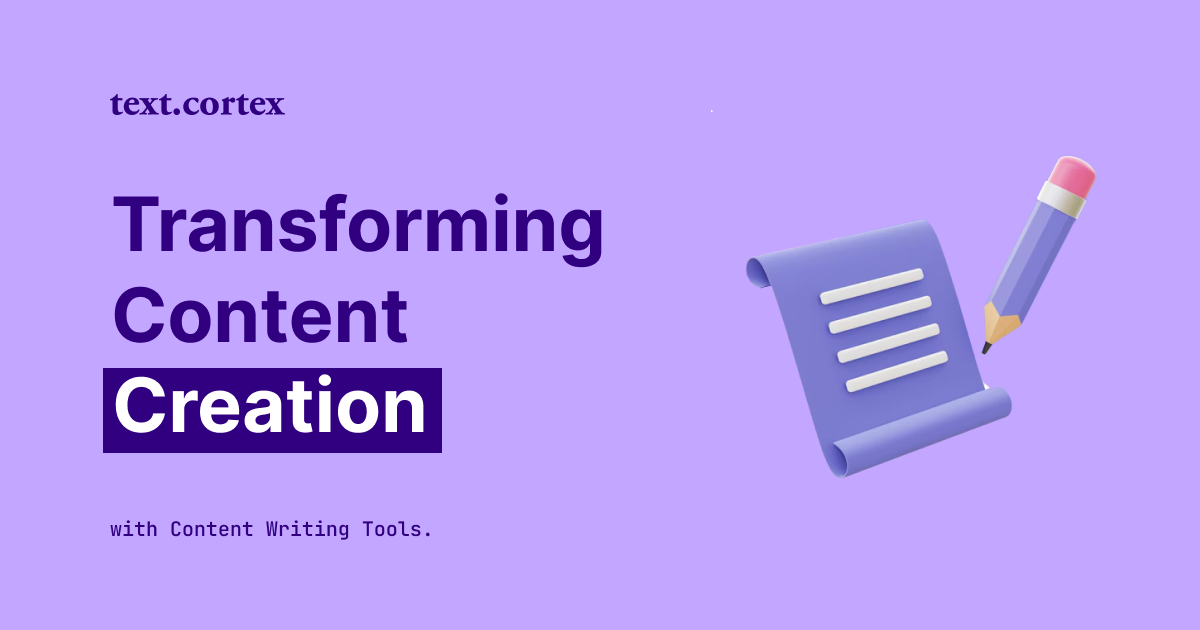Tight deadlines, work piled up, yet you cannot puzzle your words without hard effort – does this sound familiar?
So you're faced with writer's block, huh?
That can be frustrating on the level that only writers actually can imagine.
It is almost like your brain has software dysfunctionality that you are unaware could exist.
The good news is that it is a temporary and fixable "condition."
Today, we will explain and give you the best tips that can help you overcome writer's block and the difficulties that come with it.
We will help you learn how to overcome writer's block moments and drastically improve your daily writing routine using 9 simple but effective hacks.
So if you’re ready, let's get started.
What Is Writer's Block?
You know that scenario when writing an article, and the creative juices just aren't flowing?
Writer's block is that kind of mental barrier that every writer sometimes struggles with.
You try hard to start writing as stipulated by the instructions/tasks, but suddenly it seems that your "mind is blank," and you can't continue.
So What Are The Causes Of Writer's block?
A research study on writer's block found these causes as possible triggers:
- The limitations of subject and time
- Problems with the writing process since primary school
- The anxiety of being controlled and assessed by grades
- Fear of being criticized
- The negativity of classroom settings
- Lack of information about writing
- Not being able to read
- Shortcomings in the vocabulary
But, fear not.
Even famous writers, poets, and journalists have been experiencing the same thing for ages.
Are You Really Suffering From Writer's Block?
People often overlook that writing out of inspiration is not the same as when you have to make a living out of it.
When sit down to write a new article, you can often face writer's block.
And each time, there is a different reason it shows up.
Sometimes you are just not a big fan of the subject.
At other times you have an idea of how to write it, but you cannot put it on paper to satisfy the overall idea previously created in your head.
How to know you are dealing with writer’s block?
Imagine your car went out of fuel in the middle of nowhere, and you are looking around to find the closest gas station to fill your tank and keep the vehicle moving.
So, if you feel that your brain engine is out of "gas," – then yes, you are experiencing writer's block.
How to Overcome Writer's Block
Even though it is considered a phenomenon, putting an end to writer's block is possible.
It is a matter of personal workflow setup, which differs from person to person.
We promised you the best hacks that are easy to utilize in your writing process and help you create your work routine, right?
Let's check them out.
1. Break Your Project Down into Manageable Tasks
No matter how big or daunting a task may seem, the trick to comfortably powering through it is to break it down into manageable, bite-sized chunks.
Each of those chunks will be easier than the whole, which will help you feel good about moving things forward.
When you're chunking things into small tasks, you feel a greater sense of self-accomplishment as you cross each task off your list.
And that's satisfying.
Creating an outline can be a good way to start.
2. Reduce Distractions Before Writing
Distractions can damage your productivity, so you should get rid of them before writing.
The best way to reduce distractions is to create a distraction-free environment.
Try writing in quiet places – in other words, no coffee shops or co-working spaces where there are dozens of people around.
Avoid social media, games, and even specific websites.
If this is hard to apply, you can always rely on tools that eliminate distractions, such as Keep me Out, Anti-Social, Stick, etc.
But even with a strict limit in place, it’s still possible that a new distraction could intrude upon your concentration.
When that happens, evaluate whether or not the interruption will harm your progress toward your writing goal and decide based on that evaluation.
3. Set Concrete Deadlines
If you're having trouble producing work, make time for it.
Even if it's tough to get started, try setting aside a block of time when you're committed to writing.
Putting time on the calendar to write will ensure that you stick with your routine.
Many authors find that getting started at a specific time can help them keep up their momentum.
So force yourself to write for a couple of minutes every day, even if you do not feel like it.
That is enough time to warm up your brain engine, and writing will become much easier.
4. Get Outside of Your Comfort Zone
Expand your horizons, try something new, and put yourself out there.
Exercising your writing muscles and getting feedback on your writing is how you grow as a writer.
Try writing a book review.
That can be beneficial in two ways – it will make you read more, and it is a good exercise.
Or, consider writing in a journal every day for a month and then check your thoughts.
Write about any topic you're curious about with no grinding.
The worst that can happen is that you don't like the result. But, even then, hashing out an idea or trying something new is helpful.
5. Write in a Different Location or Time
Change up your writing environment by switching locations or times of the day.
If your usual writing spot is at home, try writing at coffee shops with a low frequency of people or libraries.
If you usually write in the morning, try doing it at night for a change.
The more you force your mind to adjust, the easier it will be to begin writing.
Plus, on days that you find yourself especially bogged down by distractions, there’s a good chance changing to a different environment will help bring you back on track.
6. Give Yourself the Space to Think, Vent, and Mull Things Over
We sometimes expect too much from ourselves, which is easily remedied with a bit of break.
If you're struggling to find the right direction for your work, consider trying this exercise and seeing if it can help get you unstuck.
Pomodoro technique – To stimulate an idea, decide on a writing topic.
Then, set a timer for 25 minutes – don't pause or stop writing until the clock rings.
Take a five-minute break. Do something you like, vent your brain, and refresh your thoughts.
Repeat this process, sticking to your word count.
Remember – we all need a little space to think. And sometimes, that's exactly what will help us write our best work.
7. Try "Freewriting" or "Free Associating"
Freewriting and free-associating are great tools to use when gathering your thoughts together.
The idea behind it is not to edit yourself but rather to write freely and without the stress of consequence.
The skill of writing without forethought is essential for being able to write on the spot, in your own time.
Freewriting can be an excellent way to harness raw creativity and get into the "zone."
The best way to flesh out the different possibilities for a new idea is to use the 5 Whys technique.
The 5 Whys is a simple brainstorming exercise that cuts through complicated problems to get at the root of an obstacle or setback.
By asking a series of five questions – Why? Why? Why? Why? Why? – you can break out of surface-level problem solving to generate novel solutions.
8. Exercise Your Writing Regularly
Creativity is a habit.
That may seem counterintuitive, but creativity happens most authentically when it's intentional.
If you wait until you feel creative to write, you'll find yourself stuck in a rut.
You can not order it like a pizza slice, but you can practice it.
So, create a routine that works for you and enjoy it.
Having fun while writing can inspire your creativity even when you think it is not there.
Practicing it will boost your self-confidence and create open space for creativity to show up.
9. Adopt an AI Copywriting Tool to Ease Processes
Sometimes you just need a little push to keep the ball rolling.
Adopting an AI copywriting tool can help you create more engaging and compelling content much faster than before.
Why?
AI tools are created to automate processes for you.
They can help you generate content, such as blog titles, blog posts, emails, ads, etc., in seconds.
To help you get a better picture, let's put this into practice for a moment.
So you have a few ideas swirling around in your head. You have an impressive set of facts and a blog title for your latest article.
But then there's the same familiar flow – you are arguing with your fingers to write an intro.
Let's check how AI tools can help you with this using TextCortex as an example.
If you’re dealing with writer’s block, all you need to do is enter a few-word idea about the topic, and TextCortex will cover the rest.
Enter the topic idea, highlight it, and hit the “Long-form post” button.
In case there’s any part of the content you want to improve, just highlight it and click on “Rewrite.”
Whole paragraphs that are engaging and easy to read, created and paraphrased in seconds and within any textbox online.
Primary benefits for implementing AI tools in your writing flow:
- Write your content up to 10x faster
- Save 70% of your time
- Create content at scale
- Brainstorm your ideas in seconds
- Say "goodbye" to writer's block permanently
To Sum Up
The number one excuse for not cranking out content is writer's block.
Entrepreneurs and marketers put this issue on a pedestal.
They fear writer's block as if it were some untamable monster that doesn't play by any rules.
But what if writer's block isn't real?
The best-selling author and entrepreneur Seth Godin once wrote:
"There's no such thing as writer's block. There's simply a fear of bad writing. Do enough bad writing, and some good writing is bound to show up."
Keeping consistency in the writing routine is essential for any successful writer.
We hope this article has inspired you to try new things.
By applying these tips, you will better handle your projects and keep the focus always on track.
There are times when you might be momentarily stuck and when it's hard to find the right words.
Automating the process with TextCortex can help overcome both of those challenges.
Not to mention, it will save you money and reduce the time you spend on writing.
Stop experiencing writer's block immediately.
Download the TextCortex Chrome Extension and watch how it skyrockets your inspiration and creativity immediately.


.jpg)

